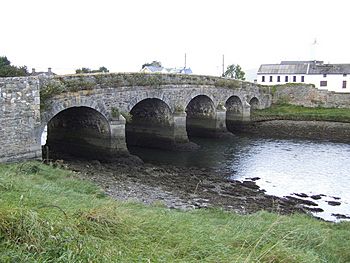River Dee (Ireland) facts for kids
Quick facts for kids River Dee |
|
|---|---|

Annagassan Bridge, where the R166 crosses the Dee
|
|
| Native name | An Níth |
| Country | Ireland |
| Cities | Nobber, Ardee, Annagassan |
| Physical characteristics | |
| Main source | Teevurcher, County Meath |
| River mouth | Irish Sea at Annagassan via Dundalk Bay |
| Length | 60.4 km (37.5 mi) |
| Basin features | |
| Basin size | 392 km2 (151 sq mi) |
| Tributaries |
|
The River Dee (Irish: An Níth) is a river in eastern Ireland, flowing from County Cavan to join the Glyde in County Louth.
Legend
In the Táin Bó Cúailnge, Cúchulainn fights Lethan at Ath Carpat ("chariot ford") on the river Níth. This takes its name from the Irish níth, meaning "combat". The modern name Dee derives from the town of Ardee (Baile Átha Fhirdhia, "town of Ferdiad's ford").
Course
The River Dee springs near Bailieboro in County Cavan and flows in an easterly direction for 37.75 miles (60.75 km) through County Meath and County Louth before entering the River Glyde at the village of Annagassan. The Dee in turn has three main tributaries: the Killary River which joins south of Drumconrath, County Meath, the Gara River which joins west of Ardee, County Louth, and the White River which joins north of Dunleer, County Louth. There is one lake on the Dee called Whitewood Lake which is near Nobber, County Meath.
Wildlife
The River Dee is a brown trout fishery.

